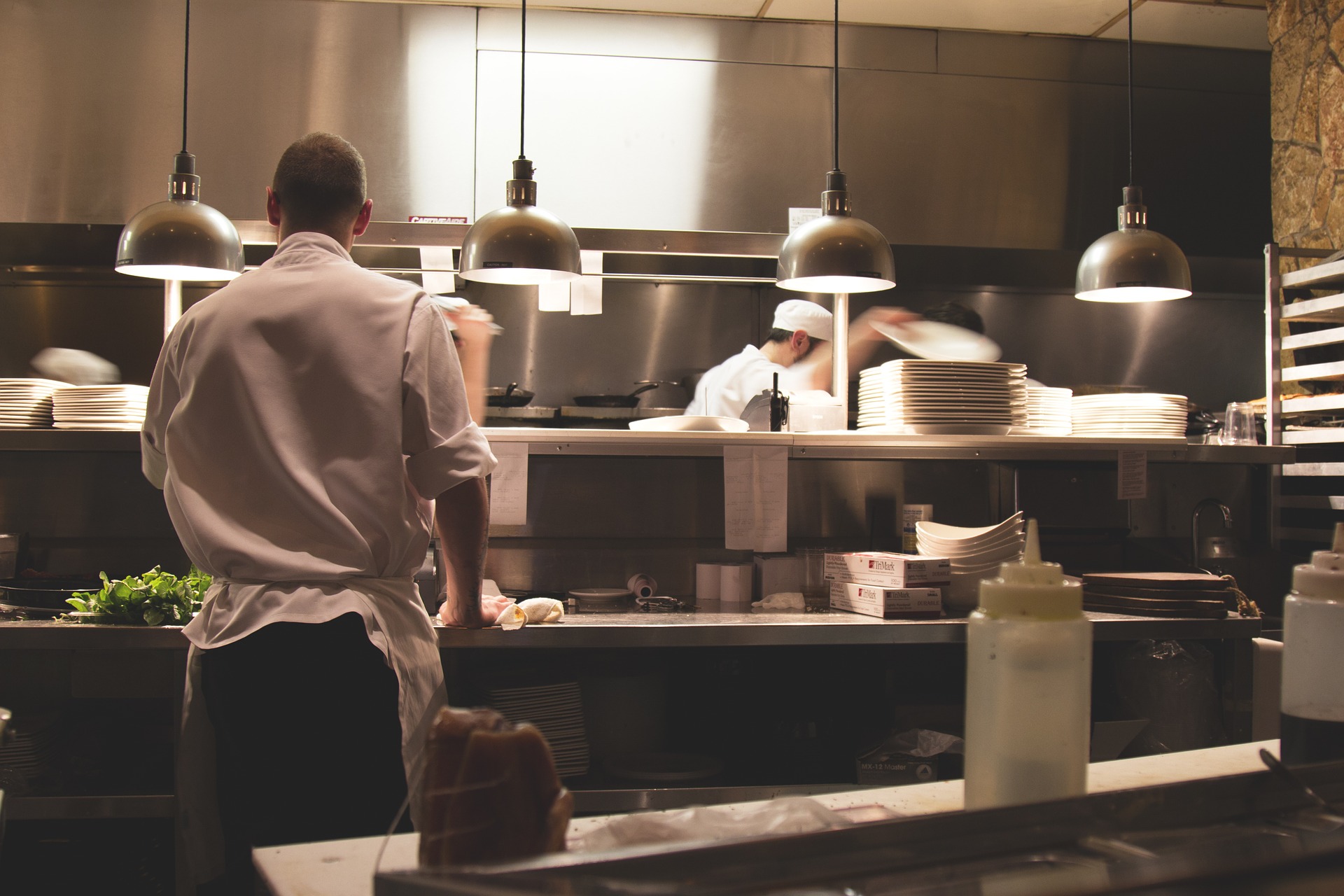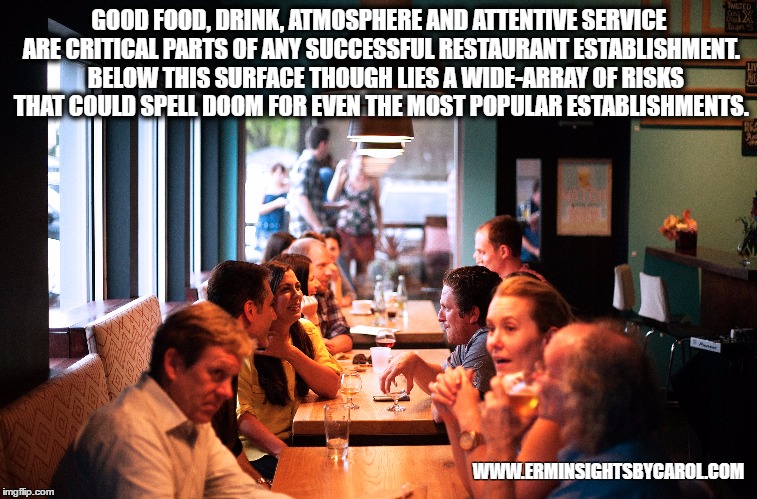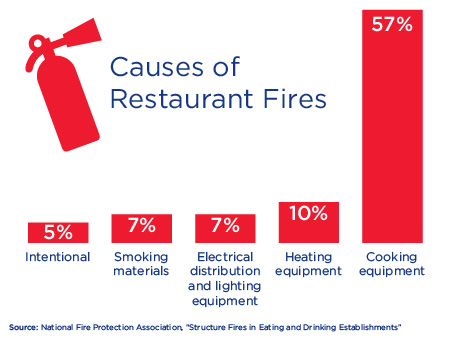It’s no secret that running a restaurant is hard…
My husband’s grandfather, who was a successful business owner, told him that if a restaurant breaks even in 3 years, they’re doing really well.
For some reason, his statement has stuck over the years, and it is something I think about frequently, especially since I started supporting companies and their risk management activities.
Good food, drink, atmosphere and attentive service are critical parts of any successful restaurant establishment. Below this surface though lies a wide-array of risks that could spell doom for even the most popular establishments.
In order to protect your reputation, profits and even the very survival of your restaurant, it’s important you understand and proactively manage common risks.
Below are 8 common risks restaurants in encounter in their day-to-day operations that can have devastating consequences.
Restaurant Risk #1 – Securing your Premises
Any place of business where the general public will visit carries a higher level of risk, and therefore, a higher level of liability should an incident occur. If a patron or even an employee is the victim of a robbery or assault on your premises, you can be held liable. Business owners have a legal obligation to ensure their premises are safe.
To address potential issues with security, Florida restaurants should:
- Make sure parking areas and the perimeter of your building is well lit.
- Don’t allow shrubs or other vegetation to grow to the point that a criminal can remain hidden.
- Consider adding video surveillance around entry ways, cash registers and loading docks for extra protection. Monitoring your cash registers is important for preventing both employee and general theft.
- If you’re in a higher crime area or open late into the night, consider hiring a nighttime security guard.
- Purchase an insurance policy with liability and crime coverage just in case, so you have assistance with the financial impacts after something does happen.
Again, if it’s determined that you should have known and taken steps to mitigate a security risk but you didn’t (i.e., you were negligent in your duties to keep your customers and employees safe), damage awards could be significant.
Restaurant Risk #2 – Slips, trips and falls
Injuries caused by slips, trips and falls are by far the most common risk facing restaurants in Tallahassee and throughout Florida – an unmarked wet floor, a spill, clutter in passageways or uneven sidewalks are a few ways an accident can occur at your establishment. Any customer injuries will be subject to a legal claim while an employee injury can cause someone to miss work and increase your workers’ comp costs among other things.
 To prevent these types of accidents, bars and restaurants should:
To prevent these types of accidents, bars and restaurants should:
- Keep floors clean and dry, or put up warning signs if a floor is wet.
- Clean any spills immediately.
- When cleaning floors, use a non-skid wax.
- Clearly mark any changes in the floor level.
- Uneven surfaces either inside (floors) or outside (sidewalks) should be repaired as soon as possible.
- Use non-slip mats where water is used, like bathroom and kitchen sinks.
- Make sure lighting is adequate, especially around stairs, hallways, and entry ways.
- In the fall and spring, make sure leaves and other debris from trees do not pile up. Wet leaves on pavement can be very slippery!
Like security, an establishment can be held liable if they knew or should have known about a risk and did nothing to address it.
Restaurant Risk #3 – Fires
According to figures from the National Fire Data Center (NFDC), restaurant fires in the U.S. cost an estimated $172 million annually. Cooking equipment is the cause for the majority of confined kitchen fires, while electrical malfunctions are the primary cause of larger non-confined fires, according to the NFDC.
Fortunately, over 90% of confined kitchen fires cause limited damage at an average cost of $840 per instance. However, unconfined fires cause much greater damage and cost nearly $60,000 on average.
To minimize the risk of a fire occurring, or damages should one occur, restaurants should:
- Keep sprinkler systems up-to-date and have the system inspected regularly by a certified contractor.
- Keep careful records of your sprinkler system’s maintenance, inspections and more.
- Clean and degrease fryers regularly and have them inspected by a certified professional.
- Regularly inspect exhaust systems for grease buildup and clean as needed.
- Consider installing an automatic fire suppression system in your kitchen.
- Regardless of your sprinkler and any fire suppression system, keep portable fire extinguishers on hand and easily accessible.
- Make sure your staff is adequately trained to handle an emergency situation, including evacuation procedures.
- Make sure any contractors you use for inspections or cleaning have adequate insurance, including “…additional insureds and hold harmless clauses for negligent performance.” The state (e.g., the Florida Department of Business and Professional Regulation) likely requires these professionals to have liability coverage for the type of work they do. Get and keep an updated copy of their policy in the unfortunate event you need it.
Unfortunately, many restaurants skip preventative measures since profits and budgets are notoriously tight in the restaurant industry. Fires are not only costly for your equipment; they can cause bad injuries to employees and guests should they get out of control. Oh, and the sprinkler and fire suppression systems mean you get significant savings on your fire insurance premiums, often time recovering the cost of the system within a few years.
Restaurant Risk #4 – Carbon monoxide
This colorless, odorless gas is known as the “silent killer” and causes over 400 deaths and 20,000 ER visits annually according to the U.S. Centers for Disease Control. Carbon monoxide is produced by fuels not burning completely in stoves, heaters, generators, cars or any fossil fuel burning machine for that matter.
As a recent example, a malfunctioning heating system in December 2016 released carbon monoxide into a North Carolina restaurant. Symptoms of CO poisoning mimic the cold and flu, but fortunately, one of the patrons was a firefighter who noticed an unusually high number of splitting headaches, nausea, dizziness, confusion and more. Carbon monoxide poisoning can also lead to brain damage in some extreme cases.
Fortunately, injuries and expensive legal claims can be avoided by regularly inspecting gas ranges and heating systems. Also, installing carbon monoxide detectors will alert you in the event of a leak. Florida law requires these detectors to be placed in hotels with gas-fired boilers. While there isn’t a specific requirement for restaurants, they are a good preventative risk measure to take and can be relatively inexpensive to purchase.
Restaurant Risk #5 – Food poisoning
Food-borne illnesses can literally ruin a restaurant’s reputation overnight. The most common types of food poisoning include salmonella and campylobacter from contaminated chicken, vibrio from raw shellfish and E. coli. According to figures from the U.S. Centers for Disease Control (CDC), infections caused by salmonella are on the decline, campylobacter and vibrio infections are increasing while progress on reducing E.coli infections has stalled.
An example of how damaging this type of incident can be is Chiptole’s. Although they have addressed the cause of the contamination, all companies will experience a longer time span to recover lost customers, restore that damaged reputation, and the additional marketing expenses to address the incident. It is best to just prevent the chances of food poisoning.
To prevent a devastating case of food poisoning, Florida restaurant owners and managers should:
- Ensure all employees have ample training in food handling, sanitation, and health safety. This includes encouraging employees to stay home when they are sick to prevent spreading any germs.
- Constantly scrutinize food handling and storage. Make sure food is stored at a proper temperature, and there is no cross-contamination between raw foods and finished dishes.
- Make sure all foods are discarded when needed.
- Constantly review where foods are coming from, including suppliers’ reputation, quality controls and recall procedures.
- Ensure suppliers have adequate insurance for product damage in transit (e.g., refrigeration in truck failed) and product recall(s).
- Obtain insurance to cover food testing and public relations in the event of a crisis.
Although the vast majority of the 45+ million food poisoning cases that occur annually are not fatal, even the mildest incident can have drastic consequences. A simple Google search for “food poisoning Tallahassee restaurants” will show several cases just in our area.
Restaurant Risk #6 – Accidents caused by alcohol intoxication
Many popular restaurants in the Tallahassee area serve at least beer and wine, while some around the Capitol, Midtown and FSU also serve liquor. A common risk for many establishments is staff that becomes complacent over time and does not follow proper serving procedures consistently.
This can especially be a problem if someone gets behind the wheel after consuming too much alcohol. Establishments can be held liable for injuries or fatalities under what is known as a “dram shop” law.
According to Florida law, restaurants in Florida are only held liable under the state’s dram shop law in two scenarios – if the patron was under the legal drinking age of 21 or if the person is known to be an alcoholic. For underage sales, the establishment is held “strictly liable,” meaning they don’t even need to be aware that the individual was a minor. If it can be proven the restaurant was reckless in serving or selling alcohol, criminal charges can be brought against the business.
To prevent these types of accidents, it is critical that restaurants serving alcohol provide training to all managers, waiters and bartenders on a consistent basis and that staff strictly adheres to these standards. In certain circumstances, providing evidence of the procedures and staff training could help reduce the impact of a claim.
Restaurant Risk #7 – Auto accidents (delivery services)
If your restaurant offers deliveries, auto accidents are just as big of a risk as food poisoning or liquor. In fact, auto accidents represent some of the biggest claims against restaurants that can easily cost millions.
It’s vitally important that you conduct background and driving record checks on any persons who will be delivering food on behalf of your restaurant.
If drivers will be using their own vehicles, make sure their insurance coverage is adequate and covers use of a personal vehicle for business purposes, including deliveries. To be extra careful, you may want to consider additional coverages.
The high cost of insurance and risks associated with food delivery is one reason many restaurants do not offer this service.
Restaurant Risk #8 – Cyber liability
One risk that’s often overlooked by restaurants around Tallahassee, and across Florida for that matter, is cyber-related risks. Just about any business today must be able to accept credit and debit cards. Although this can be convenient for both the restaurant and patron, it does pose some risks that you as a business owner or manager need to keep in mind. A quick search online will yield dozens of stories about data breaches and identity theft at restaurants.
According to an annual study by IBM and the Ponemon Institute, the cost for one lost or stolen record containing confidential information averaged $158 in 2016.
Credit and debit cards are just the beginning when it comes to cyber risk – many establishments today have smartphone apps and rewards programs that collect personal information like name, email addresses and so on.
And it’s not just hackers you need to be concerned with – servers and cashiers who handle credit cards can copy numbers and sell the information, which is why you should conduct background checks on any employee who will handle credit cards. Installing video cameras can help monitor bartenders and cashiers.
In the event of a data breach, Florida’s recently updated data protection law requires entities to notify the state’s Department of Legal Affairs within 30 days of a breach affecting more than 500 people. Establishments are also required to notify individuals affected by a breach within 30 days after determining one has occurred.
Although your restaurant may use an outside contractor to handle payment processing, payroll and benefits, the responsibility for any data breaches ultimately lies with you, which is another reason why it’s important to have insurance policy coverage for data breaches, employee theft, and identity theft.
Money is tight…but don’t risk your restaurant business
For many restaurants, budgets are tight and profit margins are pretty thin, which is why it’s tempting to carry minimal insurance coverage or simply gloss over many of the risks identified here.
Many establishments will simply do what’s mandated by law and nothing more. I believe this is a serious mistake that can have grave consequences for a restaurant should an incident occur.
Without adequate insurance coverages, policies and procedures in place, just one mishap could spell the end of an otherwise popular restaurant.
Taking proactive steps to manage risks and mitigate the negative effects should an incident occur is one of the most important things you can do to ensure your restaurant remains a fixture in the Tallahassee community.
However, many restaurants simply don’t know where to begin, which is where ERM Insights by Carol comes in. I help restaurants identify potential risks and reasonable mitigations, review current contracts and insurance policies and find the right amount of coverage for the best price.
I serve as your unbiased advocate and do NOT represent any particular insurance carrier.
Contact me today to learn more about my services and how they can help your restaurant stay on top of current and emerging risks or to discuss your situation. You can read my risk management bio to learn more about my background and why I am the right person to help you.










